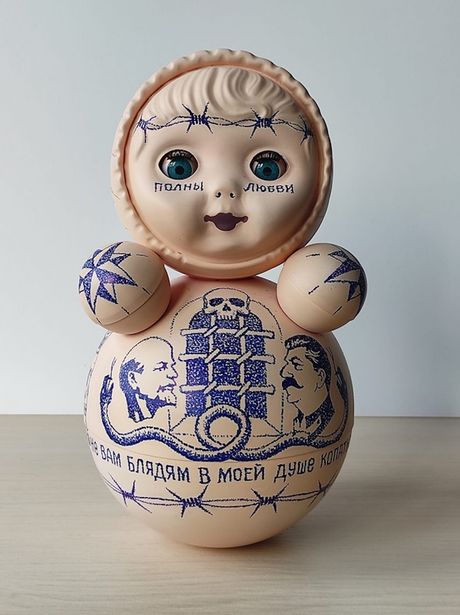
The reported death in an Arctic penal colony on Friday of Russian opposition leader Aleksei Navalny was seen by many as a frightening omen of what awaits imprisoned artists and others advocating for freedom of expression in Russia as it descends further into dictatorship under Vladimir Putin.
In court testimony on 10 February in Krasnoyarsk, Siberia, Vasily Slonov, a contemporary artist known for his ironic depictions of Russian cultural symbols and prison iconography who faces up to four years in prison on charges of displaying “extremist imagery”, said that he was being treated like Navalny.
According to a transcript of Slonov’s court appearance published by Mediazona, the human rights news site founded by Pussy Riot’s Nadya Tolokonnikova and Masha Alekhina, Slonov described the stress of having his apartment and studio searched, his computer and phone seized, and his rough treatment by investigators. He expressed disbelief that he was “equated to Navalny and called an anti-government artist who is hostile to the entire Russian people”.
The court in Krasnoyarsk, a large city in central Siberia, ruled that he be held until 7 April, but such arrests are typically extended during investigations or are converted into pre-trial prison detention. Slonov’s arrest is one of a number of cases across Russia against artists or those making visual statements against Putin and the government, against Russia’s invasion of Ukraine or using images such as rainbows that are deemed supportive of movements for LGBTQ+ rights, which were declared extremist by a November 2023 decision of Russia’s Supreme Court.
The artist had already been fined 1,000 rubles (now less than $11) after showing a version of the traditional round-bottomed tumbler toy at an exhibition of his Gulag Toys series last fall at a Novotel hotel in Krasnoyarsk. The toy was targeted by authorities for depicting stars that are associated with an amorphous criminal youth movement called AUE, an abbreviation that translates as “Prison Order Universal”. It also depicts a skull with the words “memento mori”, handcuffs, barbed wire, prisoners being abused and the words: “Whoever survived will be happy, whoever died has become happy.”
Alleged connection to the AUE movement has been used as the basis for cases across Russia. Slonov was charged with making the eight-pointed star symbol available for “viewing by an unlimited number of people” at the hotel exhibition. At the time he called it a “misunderstanding”, but once he failed to remove the doll from his social media he was charged with repeated violation, which is a criminal offense. According to Siberian media reports, Slonov was detained at the airport before his arrest with a one-way ticket to Kazakhstan.
Slonov denied in court that he attempted to flee and said that imprisoning him would result in negative international publicity: “On the eve of Vladimir Putin’s presidential elections, an unfair decision to arrest an innocent artist could turn out to be a major reputational sabotage, and Russia’s enemies could take advantage of this, denigrating and demonising the supreme and judicial authorities in Russia.” (Russia holds its next presidential election one month from now, 15-17 March.)
The artist has been described as being in the Russian historical tradition of “holy fools” who speak truth to power, rather than as a political activist per se. With his rumpled, long-bearded appearance, he resembles a classical Russian muzhik or Leo Tolstoy in his Russian peasant guise.
An exhibition of Slonov’s work in Moscow in 2018, Heavenly Jerusalem, was attacked by members of SERB, a Russian Orthodox nationalist group that took works off the walls and brought one to the police. It was a painting depicting a face that resembles Putin’s side-by-side with a skull, signed with a Biblical passage exhorting man to choose life over death. In 2019, Slonov created a samovar with Putin’s face that sold at a gallery for €10,000. He told the AiF-Krasnoyarsk newspaper that he spent his share “on the development of Russian art” and art supplies.
His wife, Yelena, has turned his Gulag Toys Instagram page, which has been wiped of the tumbler toys, into a series of updates about his case, including a photograph of his new ankle monitor and an appeal for funds to pay for his lawyers.
Marat Guelman, an art patron who went into self-imposed exile in Montenegro nearly a decade ago—he is now labelled a “foreign agent” in Russia—warned after Slonov’s arrest in an interview with Dozhd (a Russian television channel that is now also in exile) that the Kremlin would come after the entire contemporary art scene. Guelman was fired in 2013 as director of the Perm Museum of Contemporary Art, which he founded, after displaying Slonov’s posters that used prison imagery to comment on Russia and the Sochi 2014 Winter Olympics.
“In principle it is impossible to be a free artist in contemporary Russia,” said Guelman, and warned that artists who are worried about harming the Cosmoscow art fair if they speak out in support of Slonov are misguided, because “sooner or later Cosmoscow will be shut down too”.
Guelman, who had hosted Navalny and his wife at his art gallery in Moscow, on Friday posted a one-word reaction on Facebook to reports of Navalny’s death: “Bastards.”










